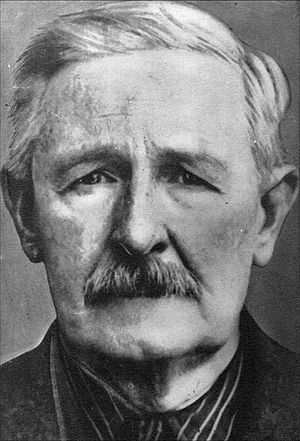Donald Macdonald (journalist) facts for kids
Quick facts for kids
Donald Macdonald
|
|
|---|---|

Macdonald c. 1920
|
|
| Born | 6 June 1859 Fitzroy, Victoria, Australia
|
| Died | 23 November 1932 (aged 73) Black Rock, Victoria
|
| Education | Keilor state school |
| Occupation | Journalist, war correspondent, sports writer, nature writer |
| Spouse(s) | Jessie Seward |
| Children | 1 |
Donald Alaster Macdonald (born June 6, 1859 – died November 23, 1932) was a famous Australian journalist and nature writer. He often used pen names like 'Observer' and 'Gnuyang' (which means gossip). He was known as one of Australia's most famous journalists. He's even in the Melbourne Press Club's Australian Media Hall of Fame, which is a special place for important media people. People say he made learning about Australian nature and plants really popular.
Contents
Early Life and Family
Donald Macdonald was born in Fitzroy, Victoria, a suburb of Melbourne, Australia. His dad was from Scotland and Canada, and his mom was Margaret Harris.
He went to Keilor state school. In 1876, he started working there as a pupil-teacher, helping younger students. Later, he joined a newspaper called The Corowa Free Press. In 1881, he moved to a bigger newspaper, The Melbourne Argus.
On February 26, 1883, Donald married Jessie Seward at Scots' Church, Melbourne. Jessie came from a well-known family in the Rochester area of Victoria. They had one daughter, Jessie Elaine (born 1885 – died July 2, 1948). She also became a writer and traveler, using the pen name 'Taunton Vale'.
A Career in Writing
Donald Macdonald became very famous for his writing. He wrote about many different topics.
Sports Reporting
Using his pen name 'Observer', Macdonald became a well-known writer about cricket and Australia rules football. He changed how sports were reported. Instead of just listing what happened, he made his reports exciting and vivid. It was like you were right there watching the game!
War Correspondent
Donald Macdonald was the first Australian to become a war correspondent. This means he traveled to a war zone to report on what was happening. He reported from the South African War. During this war, he was stuck in a place called Ladysmith while it was under attack.
His reports from Ladysmith were sent all the way to Australia and printed in The Argus newspaper. Later, these reports were put into a book called How we kept the flag flying: The story of the siege of Ladysmith (1900). He returned to Australia in April or May of 1900.
Nature Writing
Macdonald also loved nature. He started a weekly column in The Argus called 'Nature Notes and Queries'. In 1909, this column was expanded and called 'Notes for Boys'.
He wrote several books about nature for young people:
- The Bush Boy's Book (1911) – This book was so popular it was reprinted four more times between 1927 and 1933.
- At the End of the Moonpath (1922) – A nature book especially for children.
After he passed away, his daughter chose some of his best writings for a book called The Brooks of Morning (1933). Macdonald also helped create the Tourists' Handbook of Australia (1905). He even wrote a novel, The Warrigal's Well (1901), with another writer named John F. Edgar.
Later Years and Legacy
Donald Macdonald passed away at his home in Black Rock, Victoria, a seaside suburb of Melbourne, on November 23, 1932. He had a private funeral and was survived by his daughter.
Donald Macdonald Park
In May 1937, the local council in Sandringham bought some land in Black Rock. They wanted to turn it into a bird sanctuary and named it 'Donald Macdonald Park'. Today, this park is located between Fourth, Stawell, and Keating Streets, and Haydens Road. It has a playing field, a skate park, a playground, and a scout den.
Memorial Bird Bath
A special memorial was created for Donald Macdonald. It's a large bird bath with his bronze portrait on it. It was unveiled on Sunday, December 17, 1939, at the Black Rock park by his daughter. Many readers of The Argus and The Australasian newspapers helped pay for it. The sculptor who designed it was Stanley Hammond.
The plaque on the memorial says:
-
- Donald MacDonald, friend of the creatures of the wild, chose this district in which to live and to end his days.
- Born at Fitzroy 1857, died at Black Rock 1932.
- Erected by readers of his "Nature Notes" in the Argus.
You can find this memorial bird bath at the western end of the park on Haydens Road, across from Wattle Avenue.
 | John T. Biggers |
 | Thomas Blackshear |
 | Mark Bradford |
 | Beverly Buchanan |

